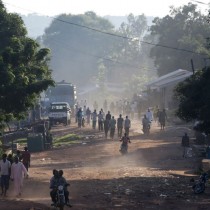
CAR Becomes Most Dangerous Spot for Aid Workers
The security challenges in the C.A.R. make it difficult for aid workers to stay safe and to deliver much needed aid. About 2.2 million people here — nearly half of the population — are in need of humanitarian assistance.
In Bambari, a flashpoint in the country, fighting involving rival armed groups has displaced about 10,000 people in the past month alone. The volatile security situation has also disrupted the ability of aid workers to provide medical care.
In late December, the Doctors Without Borders compound in Bambari was robbed twice. Mathieu Bataben, the town’s mayor, said "unidentified individuals" committed the robberies — not the armed rebel groups that control the town.
FILE -A doctor with the charity Medecins sans Frontieres (MSF) examines one of Marceline Wanou’s two sons as they recover from malnutrition in a hospital in Bambari, Central African Republic, Nov. 10, 2015.
"We deplore all that,” he told VOA in his office. "I think the cause of all that break in all that is the misery. The poverty. That could perhaps explain it. But it’s also the mentality, the education. If you’re not well educated, one can do this kind of behavior.”
The country's flag was on the Bambari mayor's desk; but, the central government has no control over the town and provides limited social services. Militias with AK-47's stand guard on the side of the road as an initial force to fend off attacks from rival armed groups. The courthouse in town is deserted. The World Food Program provides food to about 115,000 people – about half the population of the whole prefecture
The attacks on humanitarians in places like Bambari limit the ability to provide aid. In Bambari, Doctors Without Borders reduced the size of its team and its activities. The effects are not just short-term."Small children are not being immunized, so they are more vulnerable to those kinds of transmittable diseases or other activities in terms of prevention like diarrheal diseases,” Emmanuel Lampaert, Doctors Without Borders representative in C.A.R., said in Bangui.
The rate of mortality for children has increased over the past few years as a result of children not being immunized during the crisis.
Across the country, the International NGO Safety Organization recorded 27 injuries in attacks against aid workers in the C.A.R. last year — ahead of Afghanistan, Iraq and Somalia. Five humanitarians died as well.
According to Barbara Batista of the U.N.’s Office for the Coordination of Humanitarian Affairs in the C.A.R., aid organizations rely on the government and MINUSCA — the U.N.’s forces in the C.A.R. – to protect them and the civilian population.
"It’s challenging because none of the two has the means to implement full coverage,” she told VOA in Bangui. "The forces of MINUSCA are limited. They can’t cover the whole country.”
While the U.N. has about 12,000 soldiers throughout the country with heavy machine guns and armored vehicles, the government’s army and police are under an arms embargo, have little training and maintain little presence outside the capital."There have been some better conditions in Bangui, or what sometimes is called the Republic of Bangui,” Lampaert said. "But it’s clear that in the rest of the Central African territory we might say the situation has been in a full stagnation or even has deteriorated.”
The militias controlling most of the country get weapons from neighboring countries like Sudan and Chad. Lampaert said the worsening security situation is a result of fighting over natural resources, making access for humanitarians increasingly difficult.
For its part, OCHA officials coordinate with the U.N. forces to try to get appropriate protection.
"Considering that the means and capacity are limited, at least we can prioritize and say, ‘Listen, this we believe is a hot spot and should be taken care of in the coming months and weeks,’” OCHA’s Batista said, "and I have to say that so far they are reactive, they are considering what the humanitarians are saying."
Batista added that the U.N. also pursues dialogue, mediation and negotiation with armed groups.
"Even though sometimes it's a little difficult and, well, [an] ethical compromise, everything is considered in a case by case scenario,” she said.
International NGO Safety Organization reports that there is no sign of improvement and the security situation is likely to continue to deteriorate.
Source-Voice of AmericaLeave a comment
| Copyright © 2009 - 2024 Sunatimes News Agency All Rights Reserved. |
| Home | About Us | Diinta | Reports | Latest News | Featured Items | Articles | Suna Radio | Suna TV | Contact Us |
 0
0 









CAR Becomes Most Dangerous Spot for Aid Workers
BAMBARI AND BANGUI, CENTRAL AFRICAN REPUBLIC — Last year, humanitarian aid workers in the Central African Republic were involved in more than 365 security incidents — more than Syria, Afghanistan, Iraq and Somalia.